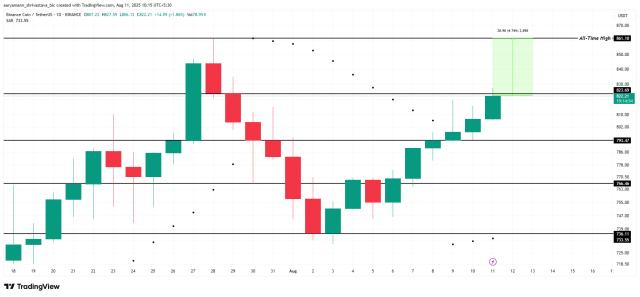
Article source: Talk Li Talk Outside
Last week, due to the disappointing U.S. non-farm data (not only were July's new employment numbers below expectations, but the data for May and June were also significantly revised downward), the announcement of a new round of import tariffs (the new tariffs will officially take effect on August 7, with some countries' tax rates reaching as high as 50%), and the superimposed geopolitical impact (last week, Trump made nuclear submarine threat remarks against Russia during an interview), the crypto market (including the stock market) experienced a new phase of fluctuations. BTC dropped from $120,000 to around $112,000, and ETH fell from $3,900 to around $3,300.
In terms of spot ETF inflows and outflows, the BTC ETF, after maintaining net inflows for seven weeks, began to experience net outflows last week, with net outflows reaching $643 million. As shown in the image below.
Zoom image will be displayed
Although the impact of macro factors has led to new market fluctuations, and some ETF funds (buyers) have become cautious again, the continuous buying behavior of major institutions/whales seems to indicate that their strategic reserve interest in BTC and ETH has not changed significantly, which to some extent alleviates the market volatility pressure.
Starting this week (8.4), the market showed some signs of rebound. As of the time of writing, BTC is maintained around $114,000, and ETH is maintained around $3,500, as shown in the image below.
Zoom image will be displayed
Now the market structure has changed quite significantly. The once wild and free-spirited crypto market, advocating liberalism and community-driven approach, has now become a digital game controlled by governments, institutional investors (including whales), and industry insiders.
Zoom image will be displayed
1. The Market Never Lacks Opportunities
In the previous article (July 30th), we discussed market opportunities more from an institutional perspective. Whether the market will have a better rebound performance may depend on several aspects, including:
- Upcoming U.S. economic data (such as non-farm employment, inflation, etc.)
- Expectations of when the Federal Reserve will change its policy
- Whether trade tariffs and geopolitical tensions can be further eased
- Inflow and outflow of market funds (such as ETF fund trends, institutional accumulation, etc.)
Market prices are always changing, but often, people's emotions seem to be constantly repeating. Whenever prices rise quickly, most people believe the bull market is coming; when prices plummet, most people think everything is over.
Different perspectives lead to different views or perceptions, which in turn bring different outcomes or endings. Compared to the emotional changes of people (within a certain range of retail investors), I am more inclined to focus on the flow of capital.
For a simple example, many people still look down on the crypto industry, believing it's all hype and air, but significant funds continue to pour into this field. In terms of financing, according to public data, approximately 131 financing rounds were conducted in the crypto field last month (July), with a total financing scale of $3.66 billion, as shown in the image below.
Zoom image will be displayed
Moreover, since the beginning of this year (YTD), venture capital and financing in the crypto field have reached $21.1 billion, already exceeding the total scale of $13.8 billion for the entire year of 2024.
It's evident that while the field still has some issues, it is maturing. If you have already entered this field but maintain a negative and pessimistic attitude, you might continue to miss some new opportunities in this area.
When it comes to opportunities, this seems to be related to everyone's investment preferences. Opportunities vary from person to person.
[The rest of the text continues in the same professional translation style]
The word "focus" is a term we often mention in our previous articles, and execution mainly refers to the action itself. The two should complement each other. For example, you can choose 1-3 sub-fields that interest you the most to maintain focus, develop your learning or research plan on a daily or weekly basis, and continuously optimize your execution strategy, rather than simply focusing on price changes on K-lines or wallet balance changes.
Earnings are just a result, while focus and execution are the process of achieving that result. Many people often fantasize or focus on how much money they want to earn, while neglecting the specific steps to earn that money, which can easily lead to inner restlessness, lack of conviction, or losing direction.
In essence, true long-term stable earnings do not come from simple blind imitation or following, but from one's own efficient focus and strict disciplined execution. To put it simply, seizing opportunities for success is not about imagination, but about staying grounded and persistently doing repetitive and correct things in your focused field every day.
2) The second level is understanding and mastering consistency
Consistency primarily means being able to maintain rationality and make reasonable decisions in various environments (such as volatile markets). The simplest example is the position management concept we often mentioned in previous articles, which means that regardless of market changes, you can make the most suitable choice based on your position plan, rather than blindly chasing one-time returns (such as pursuing a 100x surge opportunity).
Whether in investment or entrepreneurship, what truly sets people apart is not a one-time lucky success or windfall profit, but maintaining long-term stable high win rates. Among the many experienced investors I know, the more successful they are in investing, the less likely they are to be tempted by sudden high-return opportunities, and instead always maintain consistency, focusing more on stable and replicable rhythms and strategies.
To put it simply, consistency is the basis for generating compound interest. We don't need to deliberately seek one-time huge profits; as long as we don't make serious mistakes or losses, and aren't easily eliminated by the market, we can achieve long-term continuous growth.
3) The third level is building your own advantages
As we've always mentioned in previous articles, everyone is an independent individual with vastly different backgrounds, experiences, risk tolerance, and thinking models, knowledge, observation angles, and interest demands.
We can learn from others' advantages or perspectives to improve our methodology, but we shouldn't easily copy others' results, because the only thing a person can control is their own capability boundaries and cognitive advantages.
Perhaps you've seen or heard about people easily earning 100x or even 1000x by playing on-chain meme or MemeCoin, but this doesn't mean you can grasp such opportunities. Instead of consuming a lot of time doing futile work asking around for get-rich-quick secrets, it's better to calm down and think about building your own advantages.
So how can you quickly build your own advantages?
The approach isn't actually difficult; we just need to break down our long-term goals. Here are two specific examples:
For instance, I used to like researching various on-chain data, so I established a "data channel" for myself, using EXCEL to continuously collect, categorize, and organize over 300 data-related websites/tools (some commonly used tools have been synchronized to my Notion). When everyone reads my articles, they often see me citing data from various dimensions or screenshots, which are the results of my organized data channels. Similarly, I further break down independent data summaries, such as the 40+ BTC indicators in the "Bitcoin Indicator Template" I previously shared, which is an important auxiliary reference for my long-term Bitcoin investment.
Another example, during 2022-2023, I wrote some project research articles. To better understand or research projects, I designed a "project research template" (synchronized to my Notion), using EXCEL to summarize and summarize key aspects. By following the template and finding corresponding project materials and scoring them, I can quickly understand a project's potential by focusing on these points:
- The project's narrative alignment with the market and its cognitive degree (such as high visibility on social media)
- The project's product-market fit (PMF) and core growth indicator changes (Mindshare)
- Whether the project has good tokenomics (such as unlock situation, token utility, community-first distribution)
Similarly, we can establish our own information channels, decision systems, data models, circles, etc., based on our goals and needs.
In our view, long-term success is not simply achieved through a few lucky breaks, but often depends on continuously building and accumulating one's own advantages. One or several successes might help you earn quick money, but only by building your own advantages can you maintain steady progress and navigate through bull and bear cycles. Especially in the investment market, the so-called "success shortcuts" you see or others show you are often a "trap". In the long run, the advantages you build yourself are your strongest and most reliable opportunity guarantee.
We should not pursue "catching every opportunity" but instead find ways to become someone who "always has opportunities", maintaining patience, waiting for the right moment, and not being afraid of missing out.
That's all for today. The image/data sources mentioned in the text have been supplemented in my Notion. The above content is a personal perspective and analysis, solely for learning and communication purposes, and does not constitute any investment advice.
Article source: https://mp.weixin.qq.com/s/n0caK06yes5kAO0SEHirCA







